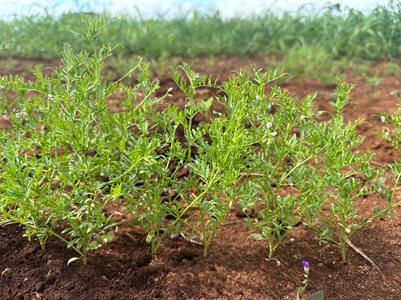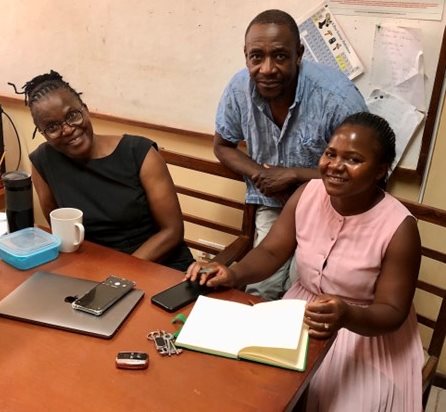The story of Lentils- Diversifying Southern Africa's food systems
Posted on 19 June 2024

Left to right: Justus, head of the legume breeding programs at DARS and Esnart Yohanne in Malawi
This article is by Hakunawadi Pswarayi, a Research Fellow in the School of Biosciences, Division of Agricultural and Environmental Sciences at the University of Nottingham. Hakunawadi is working with farmers in Southern Africa to address food insecurity under the Micronutrient Action Policy (MAPs) project.
I had always had big dreams, breaking new ground, giving back to society, and learning new things. So, back in 2014, 10 years ago now, when I migrated to Canada, I decided to detour from crop sciences (agronomy, plant breeding) to public health. Public health because it provided more opportunities in statistics. But five years later, I wanted back. I missed my first love, crop sciences. I yearned to see the little plants grow into harvest, the smell of wet soil after rains, and the free air in the fields. So, I started looking for opportunities.
Unexpectedly, I was alerted of an opportunity in statistics at the University of Nottingham. I applied. And beyond belief, I found myself a Research Fellow in statistical modelling at the University of Nottingham! Beyond my imagination, the fellowship combined opportunities in crop sciences, environmental sciences, statistics, public health, and research opportunities in southern Africa! Suddenly, I could give back to my region and country of birth, not only crop sciences and statistics, but also public health! Dreams come true.
To give back to the region, I applied and was successfully awarded research funds to establish collaborative linkages and carry out pulse research. And in March and May 2023, I met up with soil scientists, plant breeders, nutritionists, and sociologists across Southern Africa on knowledge exchange and co-designed a lentil research and promotion program.

We chose lentils, a pulse not widely grown and consumed in the region because of the several advantages they have that could help address many problems in southern Africa’s food systems. Pulses are legumes consumed as dry grain.
The several advantages of lentils are as follow. From the Micronutrient Action Policy Support tool economic simulations, lentils comprised the cheapest pulse dish of all other pulses grown in the region such as common beans and pigeon peas etc. In addition, lentils cook quickly, which saves domestic energy consumption. Southern Africa has a critical domestic energy shortage due to low capacity electricity generation, leading to frequent electricity power outages, and severe deforestation for firewood. Also, lentils are rich in protein, micronutrients and fibre. There is severe protein and micronutrient shortage in the region. Lentils also enrich the soil by adding nitrogen. And lentils have a huge international market worth billions of dollars or pounds, which will help alleviate rural poverty.
After the fruitful trip to establish collaborative linkages and co-designing the lentils research and promotion project, we were awarded by the University of Nottingham to carry out a lentil pilot study in Malawi in collaboration with the Department of Agricultural Research Services (DARS). The advantages of the pilot study are that we will be able to learn and understand the agronomic requirements of the crop at a small scale, that is with less risk, and better focus for a comprehensive understanding. After all the lentil pilot studies are the first of their kind in southern Africa. Even our collaborating partners in Malawi are also learning the crop. So, small beginnings are the best for all of us involved.
As I write this blog, our partners in Malawi are in the process of planting the pilot trials! The rains delayed a bit this season, we are told. Difficult beginnings point to good results. We can’t wait to see those little plants enjoy the southern African sun. I will be updating you as they grow.

Left to right: Dr Ivy Ligowe, Hakunawadi, Esnart Yohane from Lilongwe University of Agriculture and Natural Reosurces, Malawi